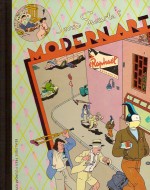
By Joost Swarte, translated by Martin Beumer (Real Free Press Int. Foundation)
No ISBN:
Joost Swarte is national treasure of the Netherlands: a Dutch New Master whose too-rare forays into comic art have always produced challenging and stunning work which manage to be simultaneously forward looking and aggressively retro and nostalgic.
He has won awards and acclaim as a writer, artist, illustrator, printmaker, graphic designer, stained glass and mural creator and furniture/architectural designer.
Born on Christmas Eve 1947, Swarte grew up in Heemstede in North Holland Province, before studying Industrial Design at the Academy for Design in Eindhoven. He gravitated to the comics field in the late 1960s, becoming adept in the classical ligne laire style of illustration favoured by Belgian star artists such as Hergé, “Bob†(Robert Frans Marie) De Moor and E.P. (Edgard Félix Pierre) Jacobs, producing children’s strips for magazines such as Tante Leny Presenteert and Jippo whilst also working as a newspaper illustrator.
In 1971 he began his own magazine Modern Papier and over the years created many evocative, stylish and memorable series such as Jopo de Pojo, Katoen en Pinbal, Anton Makassar, Dr. Ben Cine, ‘De Blauwe Berbers’, ‘Caesar Soda’, ‘Toon en Toos Brodeloos’ and Niet Zo, Maar Zo– Passi, Messa.
With his works translated into many foreign languages, including storming appearances in Art Spiegelman’s seminal Raw magazine, Swarte formed his own publishing house Oog & Blik in 1985 (a distinguished and prominent source of many superb books and albums) and in 1992 was the co-founder of the Haarlem Stripdagen, Holland’s International Comics Convention. In 2004 he was knighted by Queen Beatrix of the Netherlands.
He first gained international prominence in 1980 when he was a guest at the prestigious Salon International de la Bande Dessinée in Angoulême, France and from that year comes this superb celebratory collection of translated past works in a full-colour, board-backed signed and numbered edition which is as much objet d’art artefact as book.
From 1973 and scripted by “Willemâ€, ‘Enslaved by the Needle’ is a dark, extremely adult and fantastic Art Deco tribute to American gangster movies set in the metafictional 1930s wherein dissolute Parisian thug Fred Fallo becomes accidentally involved with the deadly Mr. Skunk – a Yankee criminal so crazy-dangerous that all the other mobs pay him to stay out of America.
Soon however, the lethal gang-lord has manipulated Fallo into sneaking him back into the USA, where the deranged mastermind begins a campaign of terror by flooding the streets with a horrifying new narcotic. As the city reels, Skunk then turns on his own confederates…
Unique style icon and bored hard-luck kid Jopo de Pojo stars in ‘Imago Moderna’ (1974, and with a clever cameo from Anton Makassar); pestered by ennui, a street missionary, subversive organisations and wicked women before being sucked into a madly paranoid midnight world whilst ‘A Second Babel’ from 1976 focuses on Nazis in Paris and a fantastic plan to build a colossal tower under the city…
Jopo de Pojo returned in ‘Une Chance sur cent Mille’ (A Chance in a Million from 1975), falling ignominiously and ineffectively into a bizarre kidnap plot whilst ‘Goodbye’ from 1977 finds inept detective Tony Priggles in well over his head investigating a string of seriously ludicrous suicides after which this beguiling tome ends with unconventional scholar Anton Makassar similarly all at sea as he tries to make his mark in the uncompromising arena of ‘Modern Art’ (1978)…
These captivatingly dark, deceptively witty and staggeringly beautiful yarns are magnificent examples of a master storyteller at his playful best and even if this particular volume is hard to find – but still well worth every effort – Joost Swarte’s work is something every mature art-lover should see.
Lucky for you then that a few other collections have been released in the last few years…
© 1973, 1974, 1975, 1976, 1978, 1980 Joost Swarte. This edition © 1980 Real Free Press Foundation. All rights reserved.
